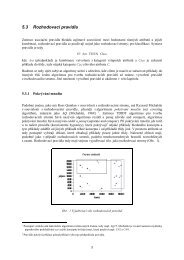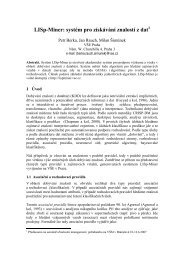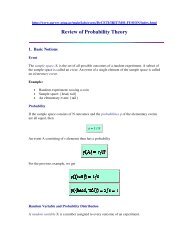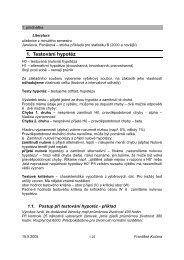LECTURE 4: PRACTICAL REASONING 1 Practical ... - Sorry
LECTURE 4: PRACTICAL REASONING 1 Practical ... - Sorry
LECTURE 4: PRACTICAL REASONING 1 Practical ... - Sorry
Create successful ePaper yourself
Turn your PDF publications into a flip-book with our unique Google optimized e-Paper software.
Lecture 4<br />
An Introduction to Multiagent Systems<br />
Lecture 4<br />
An Introduction to Multiagent Systems<br />
6 Commitment Strategies<br />
Some time in the not-so-distant future, you are having trouble with your new household robot. You say “Willie, bring<br />
Agent Control Loop Version 3<br />
1.<br />
2. BB¼;<br />
3. II¼;<br />
4. while true do<br />
5. get next percept;<br />
6. Bbrf´Bµ;<br />
7. Doptions´BIµ;<br />
8. Ifilter´BDIµ;<br />
9. plan´BIµ;<br />
10. execute´µ<br />
11. end while<br />
me a beer.” The robot replies “OK boss.” Twenty minutes later, you screech “Willie, why didn’t you bring me that<br />
beer?” It answers “Well, I intended to get you the beer, but I decided to do something else.” Miffed, you send the<br />
wise guy back to the manufacturer, complaining about a lack of commitment. After retrofitting, Willie is returned,<br />
marked “Model C: The Committed Assistant.” Again, you ask Willie to bring you a beer. Again, it accedes, replying<br />
“Sure thing.” Then you ask: “What kind of beer did you buy?” It answers: “Genessee.” You say “Never mind.” One<br />
minute later, Willie trundles over with a Genessee in its gripper. This time, you angrily return Willie for<br />
overcommitment. After still more tinkering, the manufacturer sends Willie back, promising no more problems with its<br />
commitments. So, being a somewhat trusting customer, you accept the rascal back into your household, but as a<br />
test, you ask it to bring you your last beer. Willie again accedes, saying “Yes, Sir.” (Its attitude problem seems to<br />
have been fixed.) The robot gets the beer and starts towards you. As it approaches, it lifts its arm, wheels around,<br />
deliberately smashes the bottle, and trundles off. Back at the plant, when interrogated by customer service as to<br />
why it had abandoned its commitments, the robot replies that according to its specifications, it kept its commitments<br />
as long as required — commitments must be dropped when fulfilled or impossible to achieve. By smashing the<br />
bottle, the commitment became unachievable.<br />
http://www.csc.liv.ac.uk/˜mjw/pubs/imas/ 28<br />
http://www.csc.liv.ac.uk/˜mjw/pubs/imas/ 29<br />
Lecture 4<br />
An Introduction to Multiagent Systems<br />
Lecture 4<br />
An Introduction to Multiagent Systems<br />
¯The following commitment strategies are commonly discussed in<br />
the literature of rational agents:<br />
– Blind commitment<br />
A blindly committed agent will continue to maintain an<br />
intention until it believes the intention has actually been<br />
achieved. Blind commitment is also sometimes referred to as<br />
fanatical commitment.<br />
– Single-minded commitment<br />
A single-minded agent will continue to maintain an intention<br />
until it believes that either the intention has been achieved, or<br />
else that it is no longer possible to achieve the intention.<br />
– Open-minded commitment<br />
An open-minded agent will maintain an intention as long as it<br />
is still believed possible.<br />
¯An agent has commitment both to ends (i.e., the state of affairs it<br />
wishes to bring about), and means (i.e., the mechanism via<br />
which the agent wishes to achieve the state of affairs).<br />
¯Currently, our agent control loop is overcommitted, both to<br />
means and ends.<br />
Modification: replan if ever a plan goes wrong.<br />
http://www.csc.liv.ac.uk/˜mjw/pubs/imas/ 30<br />
http://www.csc.liv.ac.uk/˜mjw/pubs/imas/ 31














